concept and organisation
Moritz Gansen | Sara Morais dos Santos Bruss | Hannah Wallenfels
#1 feral feminisms
Thursday, 10 November 2022, 7.30 pm, diffrakt | centre for theoretical periphery
Conversation with
Rivers Solomon | Alison Sperling
In this first event in the new series on speculative feminisms, the sf writer Rivers Solomon will be in conversation with the literary scholar Alison Sperling. Together, Alison and Rivers will explore a wide range of topics across the bodies of Rivers’s work, bringing short theoretical passages and concepts to Rivers’s writing and thought as well as, in equal measure, Rivers’s writing to theory. Their discussion will begin from ecological questions and explorations in Rivers’s novels and fan outward to think about the role of speculative, queer, racial, and fungal ecologies, decolonizing nature, mutualism and care, domesticity and the feral, and weird hybridities and kinships.
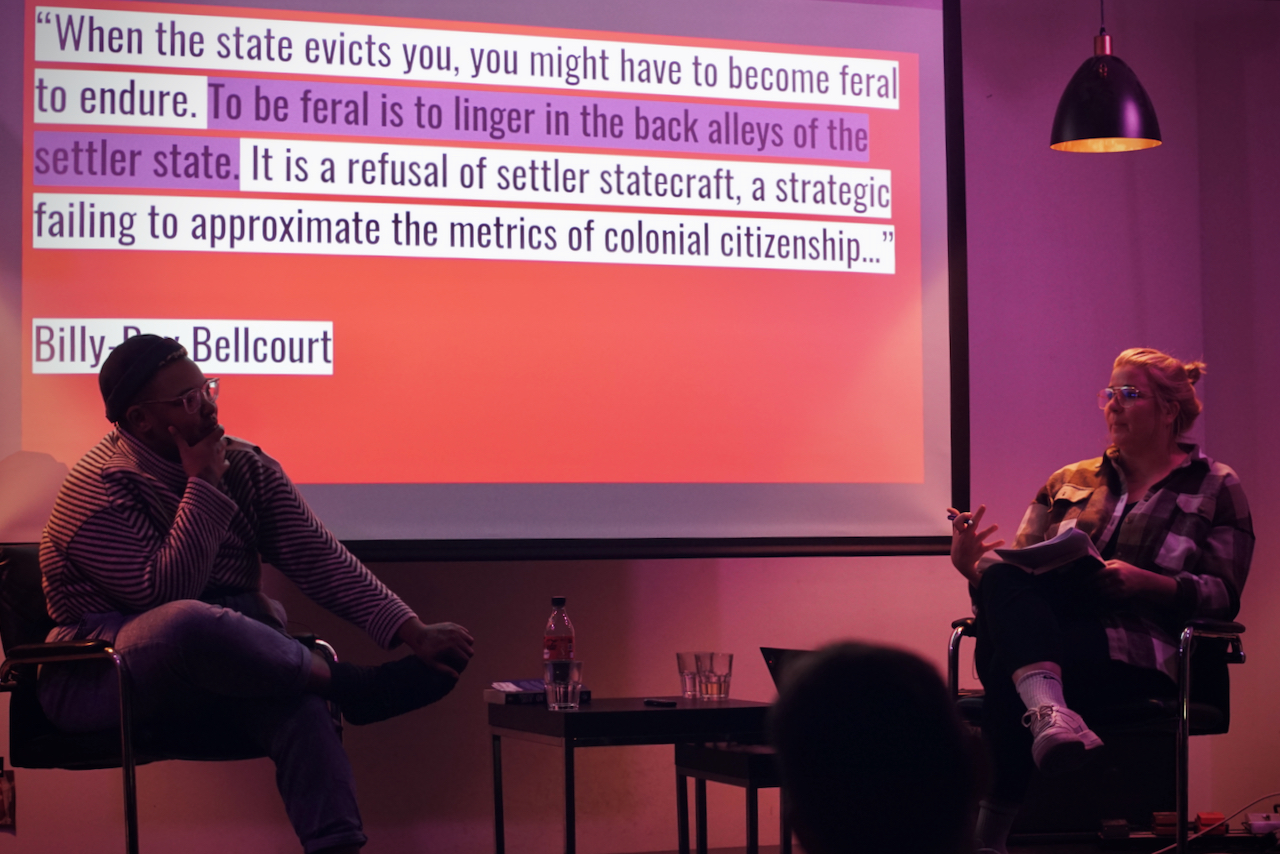
#2 matter, meaning and making
Friday, 17 March 2023, 7.30 pm, diffrakt | centre for theoretical periphery
Conversation with
Morehshin Allahyari | Moshtari Hilal | Sara Morais dos Santos Bruss
In the second session of our series on speculative feminisms, we invite the artists Morehshin Allahyari and Moshtari Hilal to discuss feminisms through the lens of their artistic practices. While Moshtari works with analog drawing, Morehshin’s art engages with new media such as virtual reality and 3D printing and modelling. Across these differences, they share an interest in intergenerational storytelling, family representations, and the hopes of bringing new perspectives into a sometimes stale discourse. The discussion will focus on matter and materialities, beginning with the very materialities of their artistic work and how these allow them to expand upon questions of identity, solidarity and difference within their respective contexts and beyond them. How does matter circulate to produce meaning? How is solidarity practiced hands-on in times of constant wars, representational politics, and social media hypes?
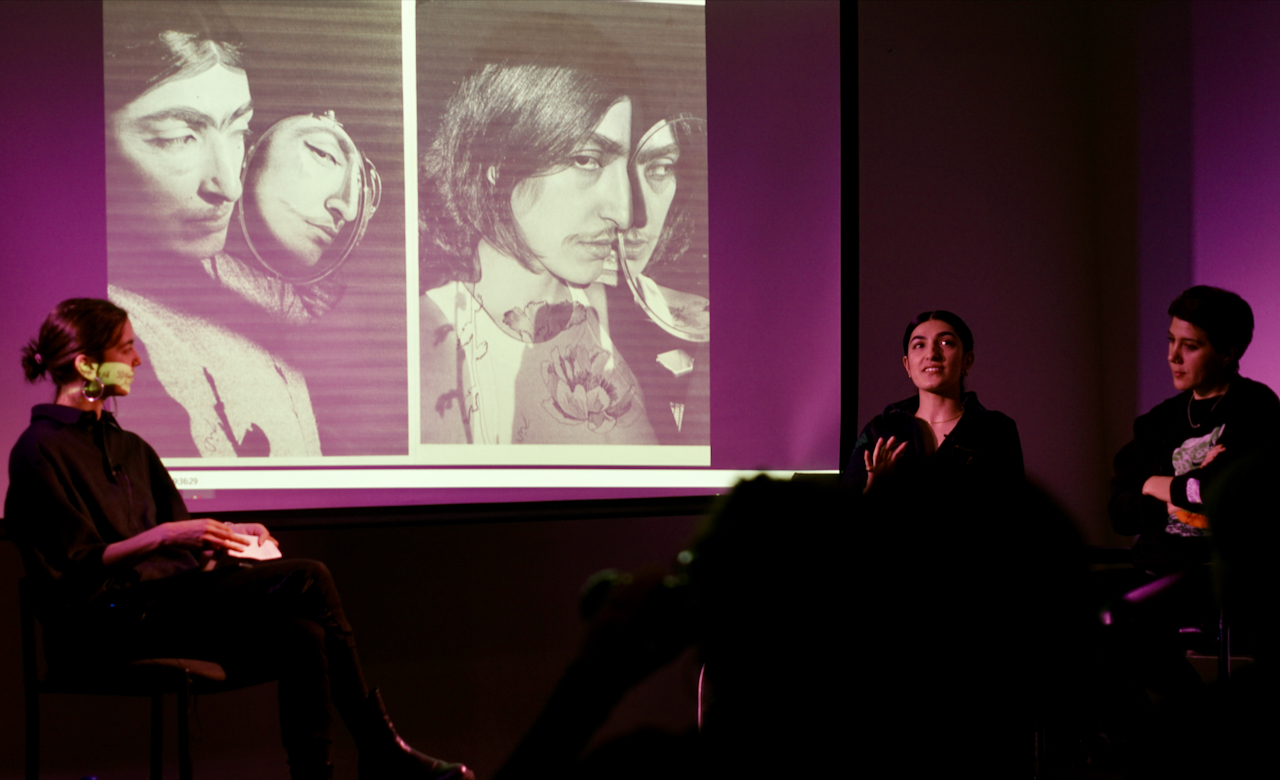
#3 Vom feministischen Schreiben
Monday, 23 October 2023, 7.30 pm, diffrakt | centre for theoretical periphery
Conversation with
Fatma Aydemir | Shida Bazyar | Ameena Quansah
– The event will take place in German. –
Was ist feministisches Spekulieren, feministisches Erzählen, feministisches Schreiben? Viele Schriftsteller*innen haben zuletzt mit neuer Dringlichkeit gezeigt, dass Experimentieren und Umschreiben (obwohl selbst ambivalent) Teil einer Praxis des Aufbrechens rassistischer, kolonialer, cis- und hetero-normativer patriarchaler Strukturen sind – mal ganz subtil und selbstverständlich, mal mit einem Schlag ins Gesicht.
Doch es geht immer schon um mehr als um das bloße Aufbrechen, es geht um Gegenentwürfe, um kleine und große Utopien, um Räume und Zeiten, in denen das Leben auch unter widrigen, allzu oft gar feindseligen Umständen stattfindet – um die alltägliche Praxis des feministischen und (post-)migrantischen Widerstands in der bloßen Existenz und den Geschichten darüber. Das Erzählen dieser Geschichten bietet einen Ausweg aus der Vereinzelung; es erschafft neue literarisch-gesellschaftliche Kollektivitäten.
Ameena Quansah spricht an diesem Abend mit Fatma Aydemir und Shida Bazyar über die Romane Ellbogen, Dschinns, Nachts ist es leise in Teheran und Drei Kameradinnen. Indem nicht nur die Autorinnen, sondern auch ihre Texte und deren Protagonist*innen miteinander ins Gespräch kommen, vertiefen wir die feministische Analyse von Beziehungs- und Familiendynamiken und der omnipräsenten Verkörperung des weißen Blickes auf rassifizierte Frauen*. In einer verwebenden Lesung und in der kollektiven Spekulation spinnen wir zugleich weiter an aufbrechenden Gedanken, sprechen über die Möglichkeiten und Grenzen feministischen Schreibens auf dem deutschen Literaturmarkt und träumen – darüber hinaus.
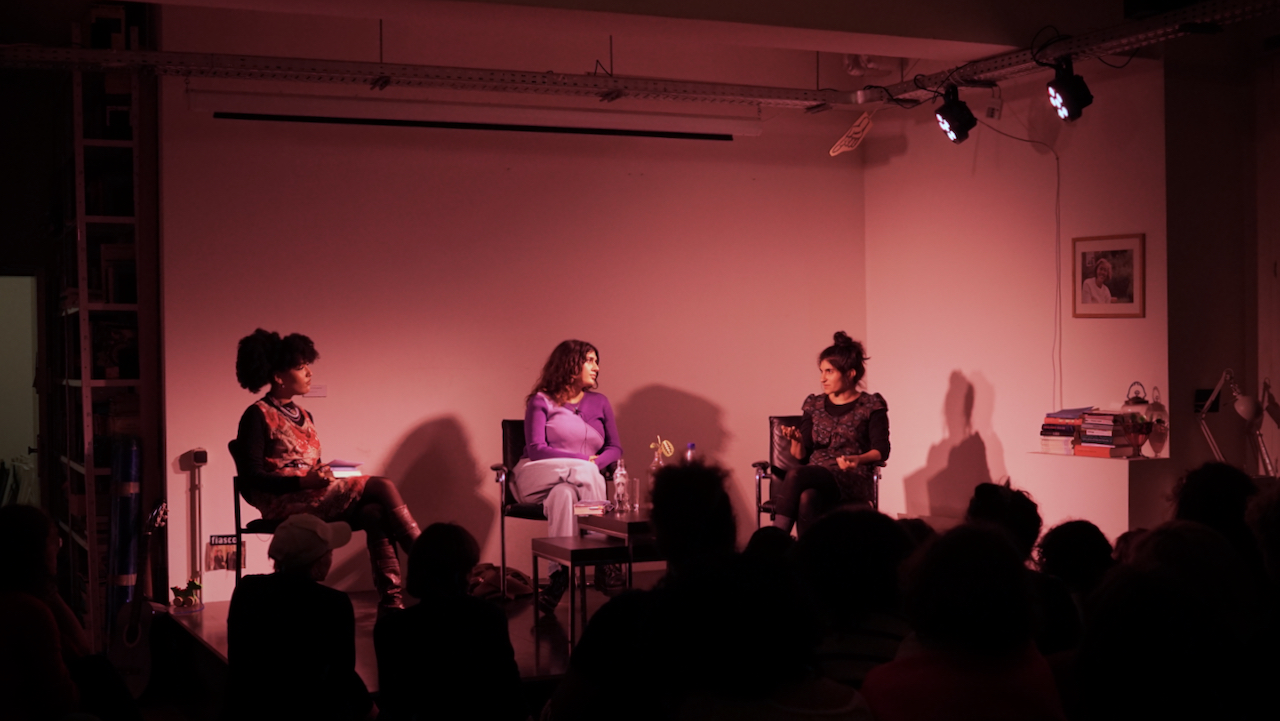
#4 Writing (the Weird), Performing (Transgression), Resisting (Identity)
Thursday, 28 November 2024, 7.30 pm, diffrakt | centre for theoretical periphery
Conversation with
Maxi Wallenhorst | Melanie Jame Wolf | Yasmin Zaher
In this conversation, writer and journalist Yasmin Zaher, artist Melanie Jame Wolf, and writer Maxi Wallenhorst will engage the representational, narrative, and strategic challenges inherent in telling stories about oppression and resistance, bodies and affect, and identities and politics. Yasmin Zaher’s debut novel The Coin challenges not only bodily and social boundaries but also the strictures of “diasporic literature”. Melanie Jame Wolf‘s work uses the allegorical, the liminal, the deceptive, and the staged as sensual conditions to explore capital, power, and gender. Maxi Wallenhorst writes on queer materialism, “dissociative style”, and German fascism on TikTok, and is currently working on a dissertation on the poetics of metabolic disruption. How do notions, affective states, and theoretical approaches of transgression, slipperiness, weirdness, or the liminal allow us to address the material conditions of the world we inhabit?
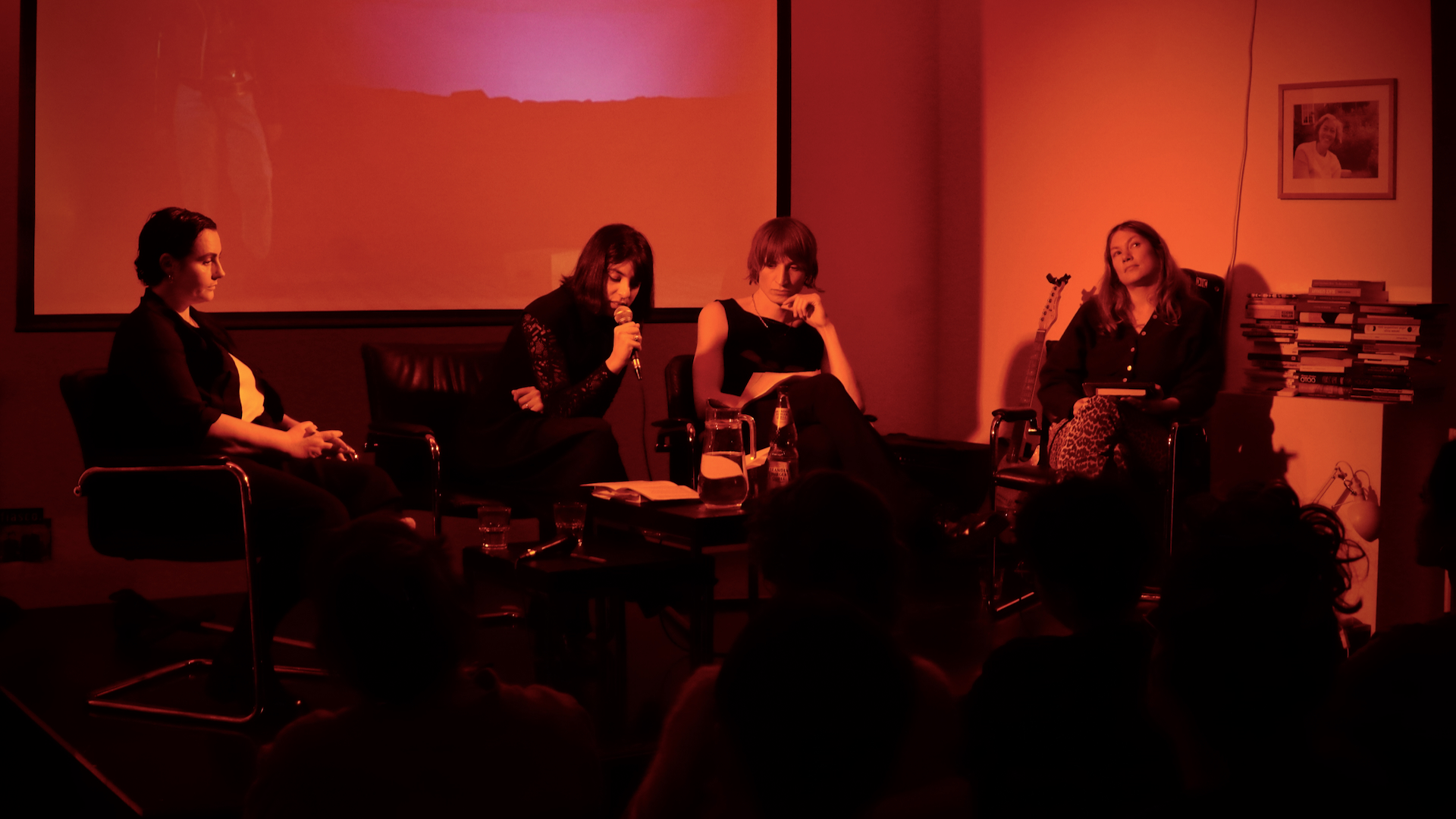
#5 Pop und Revolte
Thursday, 12 December 2024, 7.30 pm, diffrakt | centre for theoretical periphery
Listening Session and conversation with
Aida Baghernejad | Sarah Farina | Malonda
– The event will take place in German. –
Dass Popmusik politisch ist und schon immer war, lässt sich wohl kaum bezweifeln. Auch wenn Mainstream-Künstler*innen politischen Äußerungen immer wieder aus dem Weg gehen, um ihr Publikum nicht zu verschrecken, gilt auch heute noch, dass ein bisschen radical chic sich eigentlich ganz gut verkauft. Was aber bleibt, wenn die Revolte verkauft ist? Kann die Popmusik, die heute zumindest an der Oberfläche diverser denn je wirkt, tatsächlich ein Feld queer-feministischer und antirassistischer Kämpfe sein, solange in ihr die Logiken und Interessen kapitalistischer Märkte wirken? Welches Erbe treten Künstler*innen an, die heute in und neben ihrer Arbeit politisch aktiv sind? Und welche Hoffnungen haben sie in immer hoffnungsloseren Zeiten? Fragen wie diesen möchten wir mit der Kulturjournalistin und Restaurantkritikerin Aida Baghernejad, der DJ, Produzentin und Kuratorin Sarah Farina und der Sängerin, Songwriterin und Schauspielerin Malonda anhand mitgebrachter Beispiele nachgehen.
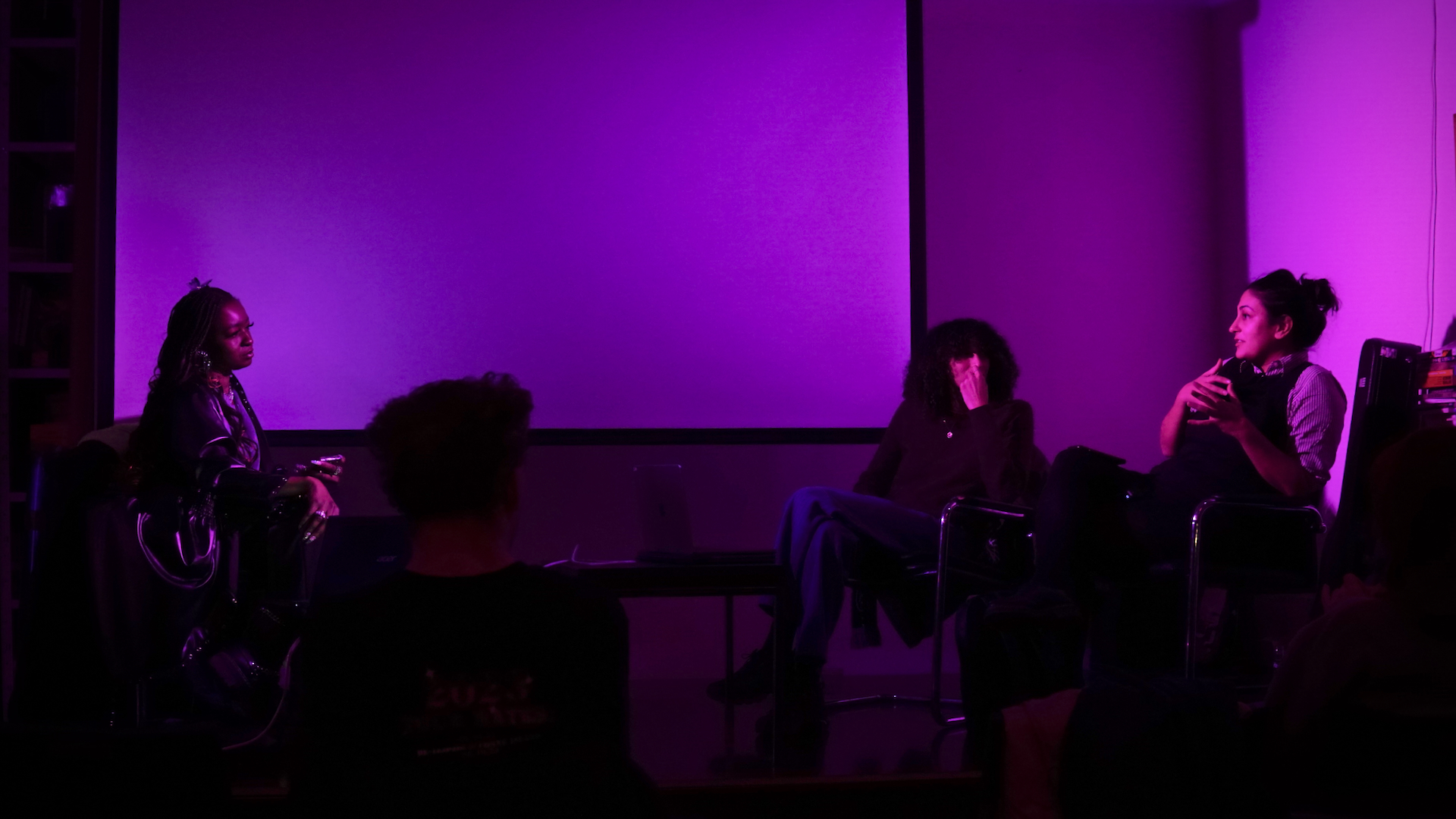
Header image: Camila de Caux, from the Compost-Writing series (with physarum polycephalum)
Press: Kompressor, Deutschlandfunk Kultur, 17 November 2022
With the generous support of
![]()